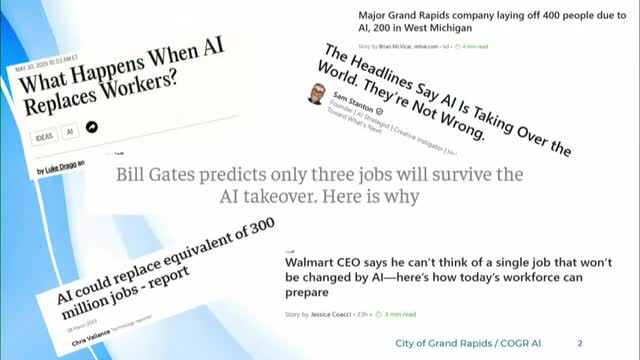City briefs commission on AI policy, forms internal AI council to develop 'AI smart' strategy
Get AI-powered insights, summaries, and transcripts
Subscribe
Summary
IT staff reviewed Administrative Policy 24‑O‑1 on AI use, described current departmental AI applications and announced formation of an internal AI council to develop a measured, ethical roadmap for city AI investments and governance; commissioners raised concerns about environmental impacts and human‑in‑the‑loop safeguards.
City IT officials briefed the Grand Rapids City Commission on Oct. 21 about the city’s administrative AI policy (24‑O‑1), current uses of third‑party AI tools across departments, and a new internal council that will develop an “AI smart” strategy for future investments and governance.
Doug Start, IT director, said the policy emphasizes transparency, accountability and a human‑in‑the‑loop approach. He noted that many departments already use AI‑enabled features through vendors — examples include cybersecurity tools, FOIA redaction, route optimization for vehicle dispatch, automated income‑tax document scanning and video analysis for sewer inspection review. “Our policy highlights several key components,” Start said, “including alignment with the city’s core values — in particular, transparency and accountability — and guidance for use cases ranging from non‑sensitive queries to human‑supervised automation.”
Start said the newly formed internal council, requested by the city manager, will include decision makers from city departments and one or two academic advisors. The council’s responsibilities will include identifying high‑impact use cases, building a data strategy (quality, governance and “gold standard” data sources), recommending upskilling and training for staff, evolving governance and ethical safeguards and measuring return on investment and sustainability impacts (energy and water use tied to data center loads).
Commissioners asked for benchmarking (how Grand Rapids compares to peer cities), for clear environmental metrics and for explicit plans to keep humans in supervisory roles when AI assists operational decisions. Commissioner Kilgore asked about the council membership and asked for a benchmark of the city’s current use compared with municipalities of similar size; he also requested two primary sustainability concerns tied to AI (energy and water use). Staff said the council will include departmental technologists and academic experts, and that sustainability and human‑in‑the‑loop safeguards will be part of the council’s review.
No ordinance or resolution was required; the briefing and the council formation were informational. Staff said the council will return with a roadmap and measurable criteria for pilot approval and evaluation.
